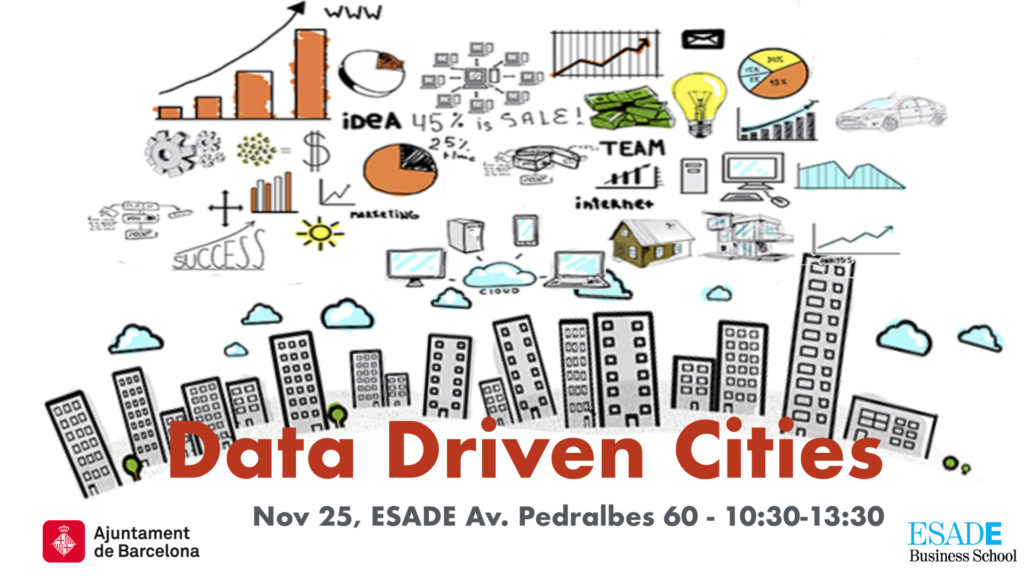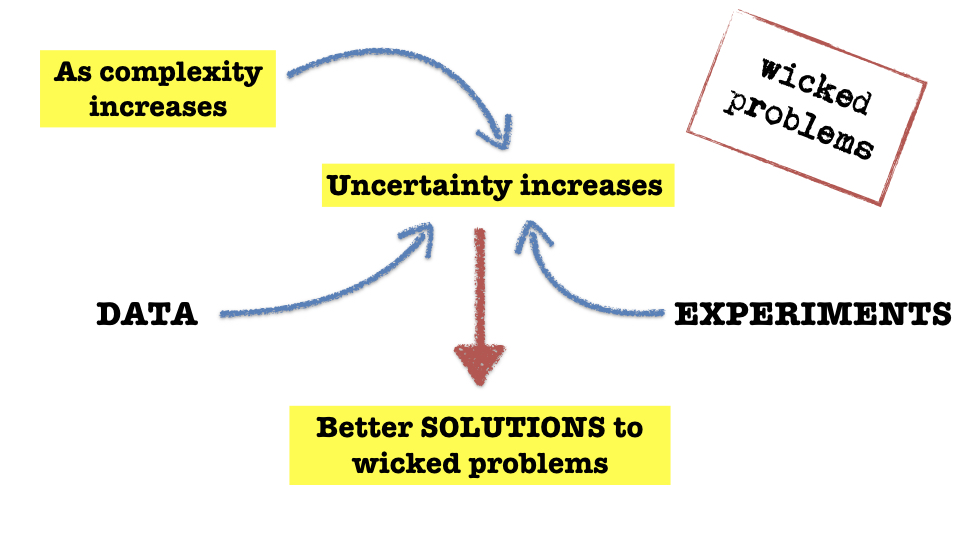Data & Cities
Last Friday November 25 Barcelona City Hall & Esade held in Barcelona an event around the use and the governance of Data in Cities. Central to this event was the discussion of what cities have to do with data and how to approach the tsunami around Big Data, Data Analytics and Data Science that is shaking and transforming companies and organizations around the world.
It’s a very new subject and I think it is fair to say that local authorities are mostly unprepared to deal with it. To summarize, not only they lack the internal competencies but best practices and general policy frameworks don’t exist yet. Only a few cities: New York, Seoul, Amsterdam, Helsinki, now Barcelona … are exploring this uncharted territory with a diversity of approaches.
Last Friday we had the opportunity to be exposed to some of them. Among all I would like to highlight three.
Geoff Mulgan, Director of Nesta, an U.K. applied research organization that centres its activities on the public sector presented what was possible the most futuristic vision of how data is going to impact cities. His basic idea was that being data the new wealth, governments should build commons that ensure that this wealth is not harnessed only by a few organizations and make sure that everybody could have access to it, allowing innovation and competition to flourish.
The clearest example was probably all the new developments, present and future, in transportation. Platforms such as Uber now and future developments such as self-driving cars or the more futuristically flying vehicles demand new mechanisms of coordination that are possibly better in public hands.
Besides this central need, Geoff presented three main lines of action around data in cities.
Firstly, the use of data to better coordinate, manage and predict service delivery in cities. This is right now the most common use of Big Data and Data Analytics. Cities always used data to understand and optimize transportation and in general service provision. Now they can harness massive amounts of data together with sophisticated machine learning algorithms to bring service provision to a new level of efficiency. The private sector has been very active and tremendously successful at that, particularly platforms such as Uber, Airbnb or Amazon that brought user interfaces and coordination mechanisms that completely revolutionized the industry.
Secondly, Geoff emphasized the case of Seoul, where data is being used not only for a better coordination and optimization but also for driving innovation to the city, an authentic living lab full of initiatives that explores the frontier of what is possible. Here is one of the areas where the need for commons and its case is more compelling.
Finally, Data for policy. Data for better inform and implement policy.
One really interesting case was the use of Google Deep Mind for Health. Health care is an area where data is meant to be a game changer. Few things happen suddenly in health and the use of data for early alert and prevention will change not only many personal lives but also the provision of health care and its associated costs. Health will become digital in not a distant but the near future.
This final case introduced the need for collaboration between the private and the public sector. If data commons ever exist, they will be a result of this collaboration.
Francesca Bria, Chief Technology Officer of Barcelona focused her presentation around Policy. Designing the Data Policy of a city is certainly challenging! No good examples exist, no best cases and no guidelines. Finding a common ground where all the actors can feel comfortable and where everybody could engage and contribute – a policy for the whole city – is certainly a significant challenge.
Her speech revolved around a new but pretty well admitted premise: data is an infrastructure. Certainly our society now relies on virtual uses as much as on physical ones. Communication infrastructures go beyond the trains, the busses and subways. Platforms such as Facebook or widely used messengers such as WhatApp or Slack are also infrastructures. Data is an infrastructure whose governance cannot be left only to the private sector. We need a new deal on data that protects users’ rights and we need to work towards technological sovereignty. These two were central points of her talk.
The projects of the Barcelona City Hall in this area were possibly the most expected part of the presentation. Among them I can highlight the announcement of a Mayor’s Office for Data Analytics and the Data Analytics projects on Housing and Tourism.
A significant emphasis was put on two lines. The need of Technological and Data sovereignty and a New Deal on Data where citizens are at the centre and in control of both their data and its use. The main lines of this new Deal were clearly specify:
- Data are used to support the delivery of better public services.
- Citizens are in control. They also feel confident that personal data are being shared responsibly to create better and more responsive services and policies which meet their needs.
- Citizens readily know how to and can access personal information held about them, allowing them to confirm accuracy.
- All data are leveraged to deliver best possible service delivery.
- When we use personal data in research the safeguards to protect privacy operate effectively and efficiently.
- Non-personal data held by the public sector is seen as a common good (or resource) which is readily available and accessible for re-use, in a format which supports this.
- Our capability is enhanced to address data challenges and opportunities so that data can inform public service design and support economic development.
- Collaboration between business, research and the public sector will ensure that Barcelona achieves this, and can grow a genuinely collaborative economy.
- The public, private and third sectors and civil society are continuously engaged in debate to ensure the continued effective use of data.
My intervention focused on a single point: Data & Policy. This is not because I don’t think other aspects are equally or even more important, but because I am a big believer of focusing on a single idea in talks. Addressing more than one area in a 15-20m presentation many times makes it confuse, ending with a long list of bullet points that are never developed in depth.
Data & Policy has also been one of my areas of research with Sabine Bunsbricker of Purdue University with whom we presented our ideas in quite some conferences. The main idea is to establish a link between Policy and complexity.
Policies have been devised since long as the implementation of political ideologies and there is nothing wrong with that in principle. However, once implemented many times we forget to check if they really work and what are the societal results and implications of these policies. As complexity increases and successful implementations become more complicated and we find an increasing number of policies that either don’t work or produce results that harm the society. Not only that, sometimes policies create monopolies supposedly protecting the public good that result being big stoppers to progress and innovation. In short, they do far more harm than good.
Data can help. The use of data to inform policies produced experimentally can help a lot in situations of medium or high complexity with multiple constituencies, conflicting interests and evolving technologies. Sounds familiar? Yes, our world today.
I presented some examples of this. First an initiative of San Francisco aimed at reducing the number of bike and pedestrian accidents to zero. It is certainly a shame that the number of traffic accidents in major cities can be counted by the hundreds still in this XXI century. San Francisco used big data technologies to detect that 70% of them happens in 12% of the intersections and devised a plan to change this 12% reducing the number of accidents, potentially to zero.
My second example came from the U.K. . All countries are making efforts to reduce health care costs and one of the common policies is to promote the use of generic instead of proprietary drugs. Theoretically savings are great but many times nobody checks and doctors continue prescribing proprietary drugs. Prescribing Analytics is a project that uses big data to look into the actual prescriptions and alert on the compliance with generics. You may be surprised to know that potential savings of 27M pounds a month in a single drug are possible if compliance is enforced.
My third and last example was about the use of experimentation. I presented some of the trials on Basic Income that are being carried on in Europe. Many European countries have in practice some kind of basic income implemented in a midst of subsidies coming from different administrations. The idea of putting all of them together is attractive but again implementation counts a lot and finding the best implementation is not easy, so some countries are running tests to explore potential implementations and their benefits.
Finally, I summarized the ideas in the talk with a simple diagram describing the interaction between societal complexity and policy and the use of data and experiments to better handle it.
Many more things happened this day. A talk of Gavin Starks, former director of the Open Data Institute, a really nice panel with many interesting interventions and proposals and a workshop with some of the most important actors on A.I., Big Data and Data Science in Barcelona. However, I wanted to highlight these three presentations that in a way present three different perspectives on how to bring much needed Data to city management.


